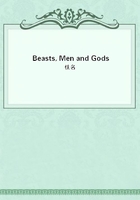
第65章 ON THE ROAD OF GREAT CONQUERORS(3)
Besides the surgeon-poisoner I met at the Hutuktu's a lad of thirteen years, whose youthfulness, red robe and cropped hair led me to suppose he was a Bandi or student servant in the home of the Hutuktu; but it turned out otherwise. This boy was the first Hubilgan, also an incarnate Buddha, an artful teller of fortunes and the successor of Pandita Hutuktu. He was drunk all the time and a great card player, always making side-splitting jokes that greatly offended the Lamas.
That same evening I made the acquaintance of the second Hubilgan who called on me, the real administrator of Zain Shabi, which is an independent dominion subject directly to the Living Buddha. This Hubilgan was a serious and ascetic man of thirty-two, well educated and deeply learned in Mongol lore. He knew Russian and read much in that language, being interested chiefly in the life and stories of other peoples. He had a high respect for the creative genius of the American people and said to me:
"When you go to America, ask the Americans to come to us and lead us out from the darkness that surrounds us. The Chinese and Russians will lead us to destruction and only the Americans can save us."It is a deep satisfaction for me to carry out the request of this influential Mongol, Hubilgan, and to urge his appeal to the American people. Will you not save this honest, uncorrupted but dark, deceived and oppressed people? They should not be allowed to perish, for within their souls they carry a great store of strong moral forces. Make of them a cultured people, believing in the verity of humankind; teach them to use the wealth of their land;and the ancient people of Jenghiz Khan will ever be your faithful friends.
When I had sufficiently recovered, the Hutuktu invited me to travel with him to Erdeni Dzu, to which I willingly agreed. On the following morning a light and comfortable carriage was brought for me. Our trip lasted five days, during which we visited Erdeni Dzu, Karakorum, Hoto-Zaidam and Hara-Balgasun. All these are the ruins of monasteries and cities erected by Jenghiz Khan and his successors, Ugadai Khan and Kublai in the thirteenth century. Now only the remnants of walls and towers remain, some large tombs and whole books of legends and stories.
"Look at these tombs!" said the Hutuktu to me. "Here the son of Khan Uyuk was buried. This young prince was bribed by the Chinese to kill his father but was frustrated in his attempt by his own sister, who killed him in her watchful care of her old father, the Emperor and Khan. There is the tomb of Tsinilla, the beloved spouse of Khan Mangu. She left the capital of China to go to Khara Bolgasun, where she fell in love with the brave shepherd Damcharen, who overtook the wind on his steed and who captured wild yaks and horses with his bare hands. The enraged Khan ordered his unfaithful wife strangled but afterwards buried her with imperial honors and frequently came to her tomb to weep for his lost love.""And what happened to Damcharen?" I inquired.
The Hutuktu himself did not know; but his old servant, the real archive of legends, answered:
"With the aid of ferocious Chahar brigands he fought with China for a long time. It is, however, unknown how he died."Among the ruins the monks pray at certain fixed times and they also search for sacred books and objects concealed or buried in the debris. Recently they found here two Chinese rifles and two gold rings and big bundles of old manuscripts tied with leather thongs.
"Why did this region attract the powerful emperors and Khans who ruled from the Pacific to the Adriatic?" I asked myself. Certainly not these mountains and valleys covered with larch and birch, not these vast sands, receding lakes and barren rocks. It seems that Ifound the answer.
The great emperors, remembering the vision of Jenghiz Khan, sought here new revelations and predictions of his miraculous, majestic destiny, surrounded by the divine honors, obeisance and hate.
Where could they come into touch with the gods, the good and bad spirits? Only there where they abode. All the district of Zain with these ancient ruins is just such a place.
"On this mountain only such men can ascend as are born of the direct line of Jenghiz Khan," the Pandita explained to me. "Half way up the ordinary man suffocates and dies, if he ventures to go further. Recently Mongolian hunters chased a pack of wolves up this mountain and, when they came to this part of the mountainside, they all perished. There on the slopes of the mountain lie the bones of eagles, big horned sheep and the kabarga antelope, light and swift as the wind. There dwells the bad demon who possesses the book of human destinies.""This is the answer," I thought.
In the Western Caucasus I once saw a mountain between Soukhoum Kale and Tuopsei where wolves, eagles and wild goats also perish, and where men would likewise perish if they did not go on horseback through this zone. There the earth breathes out carbonic acid gas through holes in the mountainside, killing all animal life. The gas clings to the earth in a layer about half a metre thick. Men on horseback pass above this and the horses always hold their heads way up and snuff and whinny in fear until they cross the dangerous zone. Here on the top of this mountain where the bad demon peruses the book of human destinies is the same phenomenon, and I realized the sacred fear of the Mongols as well as the stern attraction of this place for the tall, almost gigantic descendants of Jenghiz Khan. Their heads tower above the layers of poisonous gas, so that they can reach the top of this mysterious and terrible mountain.